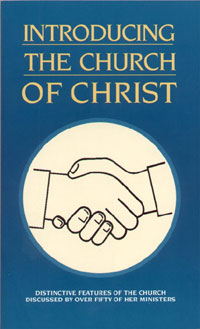Horse Cave Church of Christ
Home I CONTACT US I SERVICES I RADIO I LINKS I ELDERS I DEACONS I PREACHER I LOCATE US I ABOUT US I MISSIONS
Chapter 4: CHRIST'S CHURCH IS NOT A DENOMINATIONby Wendell Winkler( 1) Our Lord did not align himself with any party or division during his earthly pilgrimage. While our Lord lived upon the earth, there were four principle divisions among the Jews: the Pharisees, the Sadducees, the Herodians, and the Essenes. Though each of these advocated some truth, our Lord identified himself with none of them. This is most significant.(2) Additionally, let us note: (a) Our Lord prayed for unity, the antithesis of denominationalism (John 17:20, 21); (b) our Lord paid for unity, the antithesis of denominationalism (Eph. 2:16); (c) our Lord pleaded for unity, the antithesis of denominationalism (1 Cor. 1:10); and (d) our Lord planned for unity, the antithesis of denominationalism (Eph. 4:1-6). Therefore, our Lord was undenominational and anti-denominational. Thus, must his church be!
A TWO-FOLD CONTRAST
VARIOUS REASONS WHY THE CHURCH OF CHRIST IS NOT A DENOMINATION
THE CURE FOR DENOMINATIONALISMWe must have an unreserved commitment to the Bible as the sole, objective standard in religion. If three people differ as to the time of day, they can settle their differences by consulting the objective time standard, the naval observatory time. Such settles the matter, and produces unity. If a man goes to three different post offices, he will be given the same postage for mailing of his package. Why? Because each postal clerk consults the same guide book. Unity exists because of allegiance to a single objective authority. In like manner, when all men will lay down their creeds, disciplines, manuals, confessions of faith, catechisms, think-so's, maybe's, and subjective feelings and each with an unprejudiced and receptive heart turns to the word of God, then, and only then, will unity result. Such will constitute the death knell to denominationalism. We must be committed to being nothing, calling ourselves nothing, obeying nothing, and saying nothing except that which is authorized by the word of God. Only then will we have "the unity of the spirit" of Ephesians 4:1-6: one body – unity of organization; one Spirit – unity of guidance; one hope – unity of aspiration; one faith – unity of message; one Lord – unity of authority; one baptism – unity of practice; and, one God – unity of worship. To look at it another way, one of God's immutable laws is that seed bears after its kind (Genesis 1:12). Accordingly, if we preach only the gospel, it will produce in our day the one, true New Testament church that it produced in the days of the apostles, when no denominations existed. To believe otherwise, is to repudiate one of God's immutable laws! The church of Christ is not a denomination. If she were, she would surrender her right to exist (Matt. 15:13). Our Lord was undenominational and anti-denominational. His church cannot afford to be otherwise. Her plea is for pure, New Testament, undenominational Christianity. And, how encouraging it is that many are being attracted thereto.
Questions:
|
 *This booklet may be purchased from Star Bible Publications. You may call them at 1-800-433-7507 or visit their website at: Star Bibles for more information. It is also available in Spanish. | |||||||||||||||||||||||||||||||||||||||||||||||||||||||
|
Horse Cave church of Christ
Introducing the church Index
Next Chapter Note: This material is copyrighted (1981) by Star Bible Publications, Inc., P.O. Box 821220, Fort Worth, TX 76182 and is used with the express permission of Mr. Alvin Jennings, owner |